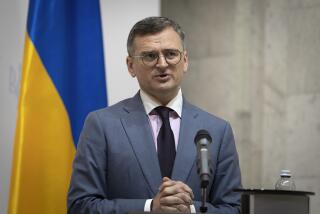Ukraine Leader Invites Rival to Form Cabinet
MOSCOW — Ukrainian President Viktor Yushchenko announced early today that he would nominate Viktor Yanukovich as prime minister, in a deal that brings together bitter foes from the country’s 2004 “Orange Revolution.”
“I have taken the decision to put forward Viktor Yanukovich for the post of Ukraine’s prime minister,” Yushchenko said in a televised address. “We have a good chance to escape the political war and pass to political competition.”
Parliament must approve the prime minister, but that is seen as certain as long as the agreement between the two rivals does not collapse, since a majority of lawmakers backed Yanukovich’s candidacy.
Yushchenko, who wants to bring his country into NATO and the European Union, said the deal was reached after Yanukovich, who favors closer ties with Russia, agreed to sign a memorandum on national unity that endorses the president’s key policies.
The president indicated that the memorandum committed Yanukovich to keeping Ukraine on course toward closer ties with Western Europe and the United States. Its wording was not immediately made public.
“We have another chance to unite Ukraine today,” Yushchenko said. He did not say whether his bloc, Our Ukraine, would formally join the majority coalition and hold positions in Yanukovich’s Cabinet. His nomination was proposed by his Party of Regions, along with the Socialists and the Communists.
The agreement followed months of maneuvering among various parties and blocs after a March parliamentary election in which no group won a majority. A constitutional deadline for forming a government passed last week, giving Yushchenko the option of dissolving parliament rather than approving Yanukovich -- a threat the president used until the last moment to extract concessions from his rival.
In June, a majority coalition agreed to nominate former Prime Minister Yulia Tymoshenko, a key Orange Revolution leader, as premier. But that deal fell through when the Socialist Party switched sides before parliament acted.
That enabled Yanukovich to form a new majority coalition, which last month proposed him as prime minister. A 15-day period for the president to respond to the proposal expired at midnight Wednesday.
Tymoshenko was a leading figure in the 2004 street protests against electoral fraud, which ultimately forced the repeat presidential runoff that brought Yushchenko to power. The protests were centered in Independence Square in the capital, Kiev, and were dubbed the Orange Revolution after Yushchenko’s campaign color, reflected in banners and supporters’ clothing.
Tymoshenko served as Yushchenko’s prime minister until the two had a falling out in September. Her party is now expected to form the main opposition.
Yushchenko sought to portray his decision to ally with Yanukovich as true to the Orange Revolution’s ideals.
“I ask people to understand that we have a unique chance about which we talked on Independence Square, about which we dreamed,” Yushchenko said in his address. The agreement with Yanukovich, he said, offers a chance to unite western Ukraine, which tends to look toward Western Europe as a model, and eastern Ukraine, which has close cultural ties with Russia.
The predominantly Russian-speaking east heavily backed Yanukovich in the 2004 presidential election and supported his party in the March parliamentary contest. The Ukrainian-speaking west and Kiev are strongholds for Yushchenko and Tymoshenko.
Yushchenko indicated that he understood some of his former supporters would be angered by his choice.
“Whatever decision the president makes, it would not have been accepted by part of the population or it will cause some misunderstandings,” Yushchenko said. “But I think that now is the very moment when we must unite Ukraine.”
More to Read
Sign up for Essential California
The most important California stories and recommendations in your inbox every morning.
You may occasionally receive promotional content from the Los Angeles Times.










